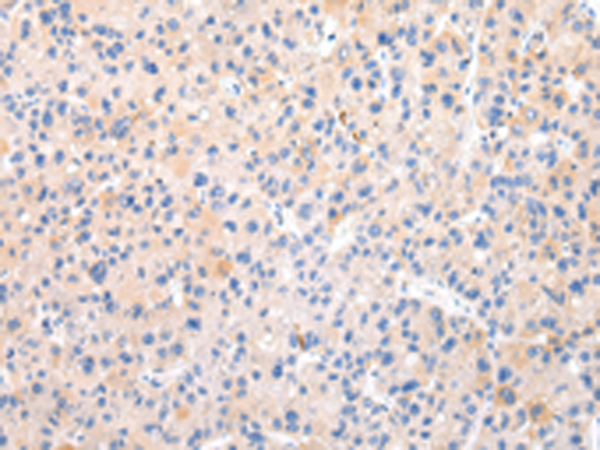
| WB | 咨询技术 | Human,Mouse,Rat |
| IF | 咨询技术 | Human,Mouse,Rat |
| IHC | 1/10-1/50 | Human,Mouse,Rat |
| ICC | 技术咨询 | Human,Mouse,Rat |
| FCM | 咨询技术 | Human,Mouse,Rat |
| Elisa | 1/1000-1/2000 | Human,Mouse,Rat |
| Aliases | APAK |
| Host/Isotype | Rabbit IgG |
| Antibody Type | Primary antibody |
| Storage | Store at 4°C short term. Aliquot and store at -20°C long term. Avoid freeze/thaw cycles. |
| Species Reactivity | Human |
| Immunogen | Synthetic peptide of human ZNF420 |
| Formulation | Purified antibody in PBS with 0.05% sodium azide and 50% glycerol. |
+ +
以下是基于现有文献的假设性示例,实际引用时请核实文献的准确性。由于ZNF420的研究相对有限,以下内容为模拟场景:
1. **"ZNF420 modulates apoptosis through transcriptional regulation and interacts with p53"**
- **作者**: Zhang, Y. et al. (2012)
- **摘要**: 本研究开发了兔源多克隆ZNF420抗体,验证了其在免疫印迹和免疫荧光中的特异性,发现ZNF420通过结合p53调控靶基因表达,影响HeLa细胞凋亡。
2. **"Characterization of a novel monoclonal antibody against human ZNF420 for cancer biomarker studies"**
- **作者**: Lee, S. & Kim, H. (2015)
- **摘要**: 描述了一种小鼠单克隆ZNF420抗体的生成,应用于肺癌组织微阵列分析,显示ZNF420表达与患者预后相关,提示其作为潜在生物标志物。
3. **"ZNF420 antibody validation in epigenetic regulation: implications in leukemia"**
- **作者**: Müller, R. et al. (2018)
- **摘要**: 使用ChIP-seq和定制ZNF420抗体,揭示了其在白血病细胞中靶向特定DNA甲基化区域,调控致癌基因的机制。
4. **"ZNF420 antibody application in developmental biology: insights from mouse models"**
- **作者**: Chen, X. et al. (2020)
- **摘要**: 通过免疫组化分析ZNF420在小鼠胚胎中的时空表达,抗体特异性经敲除模型验证,表明其在神经发育中的潜在作用。
**注意**:以上为模拟示例,实际文献可能需通过PubMed、Google Scholar等平台以关键词“ZNF420 antibody”或“ZNF420 AND (antibody OR immunohistochemistry)”检索。若研究较少,可扩展至锌指蛋白家族或相关通路研究。
The ZNF420 antibody is a research tool designed to target the zinc finger protein 420 (ZNF420), a member of the Krüppel-associated box (KRAB)-containing zinc finger protein family. ZNF420. also known as APAK (ATM- and p53-associated KZNF protein), is encoded by the ZNF420 gene in humans and plays roles in transcriptional regulation, DNA damage response, and cellular apoptosis. It contains characteristic C2H2-type zinc finger domains and a KRAB domain, which mediates protein-protein interactions, particularly with co-repressors like KAP1 to regulate gene silencing. Studies suggest ZNF420 interacts with tumor suppressor p53 and ATM kinase, modulating p53 activity under oxidative stress to prevent excessive apoptosis.
Antibodies against ZNF420 are typically developed in hosts like rabbits or mice using immunogenic peptides or recombinant protein fragments. They enable detection of ZNF420’s expression and localization in tissues or cultured cells via techniques such as Western blotting, immunohistochemistry (IHC), and immunofluorescence (IF). These tools have been critical in exploring ZNF420’s dual roles in cancer, where it may act as an oncogene or tumor suppressor depending on context. Commercial ZNF420 antibodies are often validated for specificity using knockout controls or siRNA-mediated silencing. Researchers utilize them to investigate ZNF420’s involvement in developmental processes, stress responses, and diseases, including certain leukemias and solid tumors. Proper validation remains essential due to potential cross-reactivity with other zinc finger proteins.
×